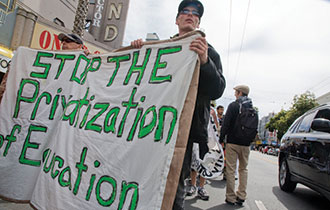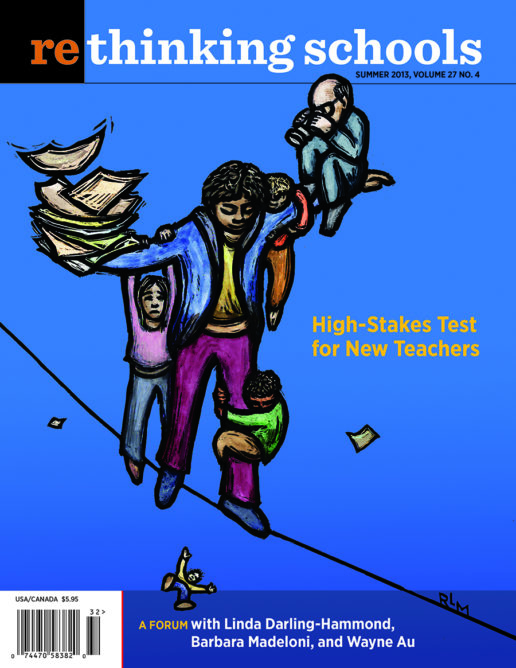Short Stuff 27.4
Crisis at City College of San Francisco
UPDATE FROM SEATTLE: TEST BOYCOTT VICTORY

“High schools may opt out of MAP in 2013–14.”
This message was sent in an all-district email blast May 13 by Seattle Public Schools Superintendent Jose Banda and led to spontaneous celebrations by teachers and students around Garfield High School.
Until now, the Measures of Academic Progress (MAP) tests were required by the school district for students in all grades (see “Seattle Test Boycott: Our Destination Is Not on the MAP,” spring 2012). A group of Garfield teachers announced in January 2013 they were no longer going to administer the tests to students at Garfield. Other Seattle schools followed suit, and the bravery of these teachers led to a national movement.
According to Jesse Hagopian, a boycott leader and editorial associate of Rethinking Schools, there’s a lesson in this victory: “If we stand for what’s right for students, teachers can win.”
He continued: “Teachers at the five Seattle high schools who joined the MAP boycott are elated by the news of this victory, but Superintendent Banda’s email also warned that students in grades K–8 will still be required to take the test next year. The key to the victory over the high school MAP test was solidarity and widespread public support, and we intend to carry these lessons forward to change policy for K-8 schools as well.”
CORPORATE REFORM “JUMPS THE FENCE”: CRISIS AT CITY COLLEGE OF SAN FRANCISCO
California is a testing ground for a new round of privatization wars. The current battleground is City College of San Francisco (CCSF), which has 85,000 students at campuses spread across the city. A low-cost, student-centered option for the first two years of college, CCSF is known for its broad variety of vocational degrees, ESL courses that serve more than 20,000 immigrants a year, and strong focus on lifelong learning.
Last spring the Accrediting Commission for Community and Junior Colleges (ACCJC) sent an evaluation team to the school. Despite the fact that CCSF had never been sanctioned, ACCJC placed the school on “show cause” status, with nine months to make mandated changes or face closure. The accreditation crisis, coming on top of years of state budget cuts, triggered what is essentially a state takeover with an appointed special trustee. Austerity measures have included cutting classes, pay cuts, and layoffs. Particularly at risk are classes without direct “labor market value” like women’s and ethnic studies. Childcare centers, art studios, and student grants were slashed, and campus activist researchers have uncovered alarming information about ACCJC with national implications. ACCJC is a subdivision of the Western Association of Schools and Colleges, one of six regional agencies that accredit public institutions. Between 2003 and 2008 the other five regions sanctioned between 0 and 6 percent of community colleges. In contrast, the ACCJC imposed sanctions on 37 percent of community colleges in California. When community colleges lose accreditation or are too starved for funds to meet student need, private colleges and online courses move in to fill the gap. In the past five years, the Gates, Walton, and Lumina foundations have been pushing for reforms to open the community college market to private investment.
Students, faculty, and community members have been fighting back. Last fall, San Franciscans overwhelmingly voted in favor of a parcel tax designed to reverse the cuts. As the June deadline for the ACCJC’s final decision approaches, protests are escalating. A May 20 demonstration at CCSF’s Mission Campus connected City College’s struggle to school closures in Chicago.
According to Alisa Messer, president of the faculty union: “Educators and unions are too often portrayed as the opposition in attempts to push austerity, undermine the public sector, and efface the important educational work we do. We will not apologize for resisting the downsizing of our students’ educations, for saving jobs, and for protecting educational programs that benefit our students—particularly our most vulnerable students.” From reporting by David Bacon (“Corporate Education Reform Hits San Francisco Community College,” Truthout, March 19, 2013) and Nancy Reiko Kato.

